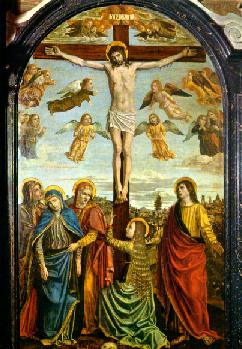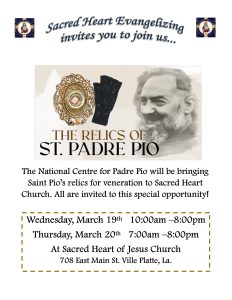Sacraments
The Sacrament of Baptism
“Go, therefore, and make disciples of all nations, baptizing them in the name of the Father, and of the Son, and of the Holy Spirit, teaching them to observe all that I have commanded you. And behold, I am with you always, until the end of the age.” (Matthew 28:19-20)
Baptism is birth into the new life in Christ. In accordance with the Lord’s will, it is necessary for salvation, as is the Church herself, which we enter by Baptism.
The essential rite of Baptism consists in immersing the candidate in water or pouring water on his head while pronouncing the invocation of the Most Holy Trinity: the Father, the Son, and the Holy Spirit.
The fruit of Baptism, or baptismal grace, is a rich reality that includes forgiveness of original sin and all personal sins, birth into the new life by which man becomes an adoptive son of the Father, a member of Christ and a temple of the Holy Spirit. By this very fact, the person baptized is incorporated into the Church, the Body of Christ, and made a sharer in the priesthood of Christ.
Since the earliest times, Baptism has been administered to children, for it is a grace and a gift of God that does not presuppose any human merit; children are baptized in the faith of the Church. Entry into Christian life gives access to true freedom.
The Sacrament of Reconciliation
“The disciples rejoiced when they saw the Lord. Jesus said to them again, “Peace be with you. As the Father has sent me, so I send you.” And when he had said this, he breathed on them and said to them, “Receive the Holy Spirit. Whose sins you forgive are forgiven them, and whose sins you retain are retained.” (John 20:20-23)
The forgiveness of sins committed after Baptism is conferred by a particular sacrament called the sacrament of conversion, confession, penance, or reconciliation. The sinner wounds God’s honor and love, his own human dignity as a man called to be a son of God, and the spiritual well-being of the Church, of which each Christian ought to be a living stone. The movement of return to God, called conversion and repentance, entails sorrow for and abhorrence of sins committed, and the firm purpose of sinning no more in the future. Conversion touches the past and the future and is nourished by hope in God’s mercy.
The sacrament of Penance is a whole consisting in three actions of the penitent and the priest’s absolution. The penitent’s acts are repentance, confession or disclosure of sins to the priest, and the intention to make reparation and do works of reparation.
One who desires to obtain reconciliation with God and with the Church must confess to a priest all the unconfessed grave sins he remembers after having carefully examined his conscience. The confession of venial faults, without being necessary in itself, is nevertheless strongly recommended by the Church.
The confessor proposes the performance of certain acts of “satisfaction” or “penance” to be performed by the penitent in order to repair the harm caused by sin and to re-establish habits befitting a disciple of Christ.
Only priests who have received the faculty of absolving from the authority of the Church can forgive sins in the name of Christ.
The spiritual effects of the sacrament of Penance are reconciliation with God by which the penitent recovers grace; reconciliation with the Church; remission of the eternal punishment incurred by mortal sins; remission, at least in part, of temporal punishments resulting from sin; peace and serenity of conscience, and spiritual consolation; and an increase of spiritual strength for the Christian battle.
The Sacrament of the Holy Eucharist
“I am the living bread that came down from Heaven; whoever eats this bread will live forever, and the bread that I will give is my flesh for the life of the world…Amen, amen, I say to you, whoever eats my flesh and drinks my blood has eternal life, and I will raise him on the last day. For my flesh is true food, and my blood is true drink. Whoever eats my flesh and drinks my blood remains in me and I in him.” (John 6:51-56)
The Holy Eucharist is the heart and the summit of the Church’s life, for in it Christ associates his Church and all her members with his sacrifice of praise and thanksgiving offered once for all on the cross to his Father; by this sacrifice he pours out the graces of salvation on his Body which is the Church.
The Eucharistic celebration always includes: the proclamation of the Word of God; thanksgiving to God the Father for all his benefits, above all the gift of his Son; the consecration of bread and wine; and participation in the liturgical banquet by receiving the Lord’s body and blood. These elements constitute one single act of worship.
The Eucharist is the memorial of Christ’s Passover, that is, of the work of salvation accomplished by the life, death, and resurrection of Christ, a work made present by the liturgical action.
Anyone who desires to receive Christ in Eucharistic communion must be in the state of grace. Anyone aware of having sinned mortally must not receive communion without having received absolution in the sacrament of penance.
Communion with the Body and Blood of Christ increases the communicant’s union with the Lord, forgives his venial sins, and preserves him from grave sins. Since receiving this sacrament strengthens the bonds of charity between the communicant and Christ, it also reinforces the unity of the Church as the Mystical Body of Christ.
The Church warmly recommends that the faithful receive Holy Communion when they participate in the celebration of the Eucharist; she obliges them to do so at least once a year.
The Sacrament of Confirmation
“Now when the apostles in Jerusalem heard that Samaria had accepted the word of God, they sent them Peter and John, who went down and prayed for them, that they might receive the holy Spirit, for it had not yet fallen upon any of them; they had only been baptized in the name of the Lord Jesus. Then they laid hands on them and they received the Holy Spirit.” (Acts 8: 14-17)
The sacrament of Confirmation is the special outpouring of the Holy Spirit as once granted to the apostles on the day of Pentecost.
From this fact, Confirmation brings an increase and deepening of baptismal grace. It unites us more firmly to Christ; it increases the gifts of the Holy Spirit in us; it renders our bond with the Church more perfect; and it gives us a special strength of the Holy Spirit to spread and defend the faith by word and action as true witnesses of Christ, to confess the name of Christ boldly, and never to be ashamed of the Cross:
Like Baptism which it completes, Confirmation is given only once.
Preparation for Confirmation should aim at leading the Christian toward a more intimate union with Christ and a more lively familiarity with the Holy Spirit—his actions, his gifts, and his biddings—in order to be more capable of assuming the apostolic responsibilities of Christian life.
To receive Confirmation one must be in a state of grace. One should receive the sacrament of Penance in order to be cleansed for the gift of the Holy Spirit. More intense prayer should prepare one to receive the strength and graces of the Holy Spirit with docility and readiness to act.
Candidates for Confirmation, as for Baptism, fittingly seek the spiritual help of a sponsor. To emphasize the unity of the two sacraments, it is appropriate that this be one of the baptismal godparents
A candidate for Confirmation who has attained the age of reason must profess the faith, be in the state of grace, have the intention of receiving the sacrament, and be prepared to assume the role of disciple and witness to Christ, both within the ecclesial community and in temporal affairs.
The essential rite of Confirmation is anointing the forehead of the baptized with sacred chrism (in the East other sense-organs as well), together with the laying on of the minister’s hand and the words: “Accipe signaculum doni Spiritus Sancti” (Be sealed with the Gift of the Holy Spirit).
The Sacrament of Holy Matrimony
“For this reason a man shall leave his father and his mother and be joined to his wife, and the two shall become one flesh.” This is a great mystery, but I speak in reference to Christ and the Church.” (Ephesians 5:31-32)
The sacrament of Matrimony signifies the union of Christ and the Church. It gives spouses the grace to love each other with the love with which Christ has loved his Church; the grace of the sacrament thus perfects the human love of the spouses, strengthens their indissoluble unity, and sanctifies them on the way to eternal life.
Marriage is based on the consent of the contracting parties, that is, on their will to give themselves, each to the other, mutually and definitively, in order to live a covenant of faithful and fruitful love.
Unity, indissolubility, and openness to fertility are essential to marriage. Polygamy is incompatible with the unity of marriage; divorce separates what God has joined together; the refusal of fertility turns married life away from its “supreme gift,” the child.
The remarriage of persons divorced from a living, lawful spouse contravenes the plan and law of God as taught by Christ. They are not separated from the Church, but they cannot receive Eucharistic communion. They will lead Christian lives especially by educating their children in the faith.
The Christian home is the place where children receive the first proclamation of the faith. For this reason the family home is rightly called “the domestic church,” a community of grace and prayer, a school of human virtues and of Christian charity.
The Sacrament of Anointing of the Sick
“Is anyone among you sick? He should summon the presbyters of the church, and they should pray over him and anoint (him) with oil in the name of the Lord, and the prayer of faith will save the sick person, and the Lord will raise him up. If he has committed any sins, he will be forgiven.” (James 5:14-15)
The sacrament of Anointing of the Sick has as its purpose the conferral of a special grace on the Christian experiencing the difficulties inherent in the condition of grave illness or old age.
The proper time for receiving this holy anointing has certainly arrived when the believer begins to be in danger of death because of illness or old age.
Each time a Christian falls seriously ill, he may receive the Anointing of the Sick, and also when, after he has received it, the illness worsens.
Only priests (presbyters and bishops) can give the sacrament of the Anointing of the Sick, using oil blessed by the bishop, or if necessary by the celebrating presbyter himself.
The celebration of the Anointing of the Sick consists essentially in the anointing of the forehead and hands of the sick person (in the Roman Rite) or of other parts of the body (in the Eastern rite), the anointing being accompanied by the liturgical prayer of the celebrant asking for the special grace of this sacrament.
The special grace of the sacrament of the Anointing of the Sick has as its effects the uniting of the sick person to the passion of Christ, for his own good and that of the whole Church; the strengthening, peace, and courage to endure in a Christian manner the sufferings of illness or old age; the forgiveness of sins, if the sick person was not able to obtain it through the sacrament of Penance; the restoration of health, if it is conducive to the salvation of his soul; and the preparation for passing over to eternal life.
The Sacrament of Holy Orders
“At the sight of the crowds, His heart was moved with pity for them because they were troubled and abandoned, like sheep without a shepherd. Then He said to His disciples, “The harvest is abundant but the laborers are few; so ask the master of the harvest to send out laborers for his harvest.” Then He summoned His twelve disciples and gave them authority over unclean spirits to drive them out and to cure every disease and illness.” (Matthew 9:36-10:1)
Holy Orders is the Sacrament by which grace and spiritual power are conferred by Christ on those whom He calls to be Shepherds of His people as Bishops, Priests, and Deacons.
What if you had the unique opportunity to be an instrument of God’s grace for the salvation of countless numbers of souls, would you embrace it?
Priesthood, for God’s sake and the sake of others, think about it, pray about it, and then do whatever He tells you (John 2:5) Please speak to Rev. Tom Voorhies or Rev. Matthew Barzare if you are discerning a Priestly or Religious vocation.




